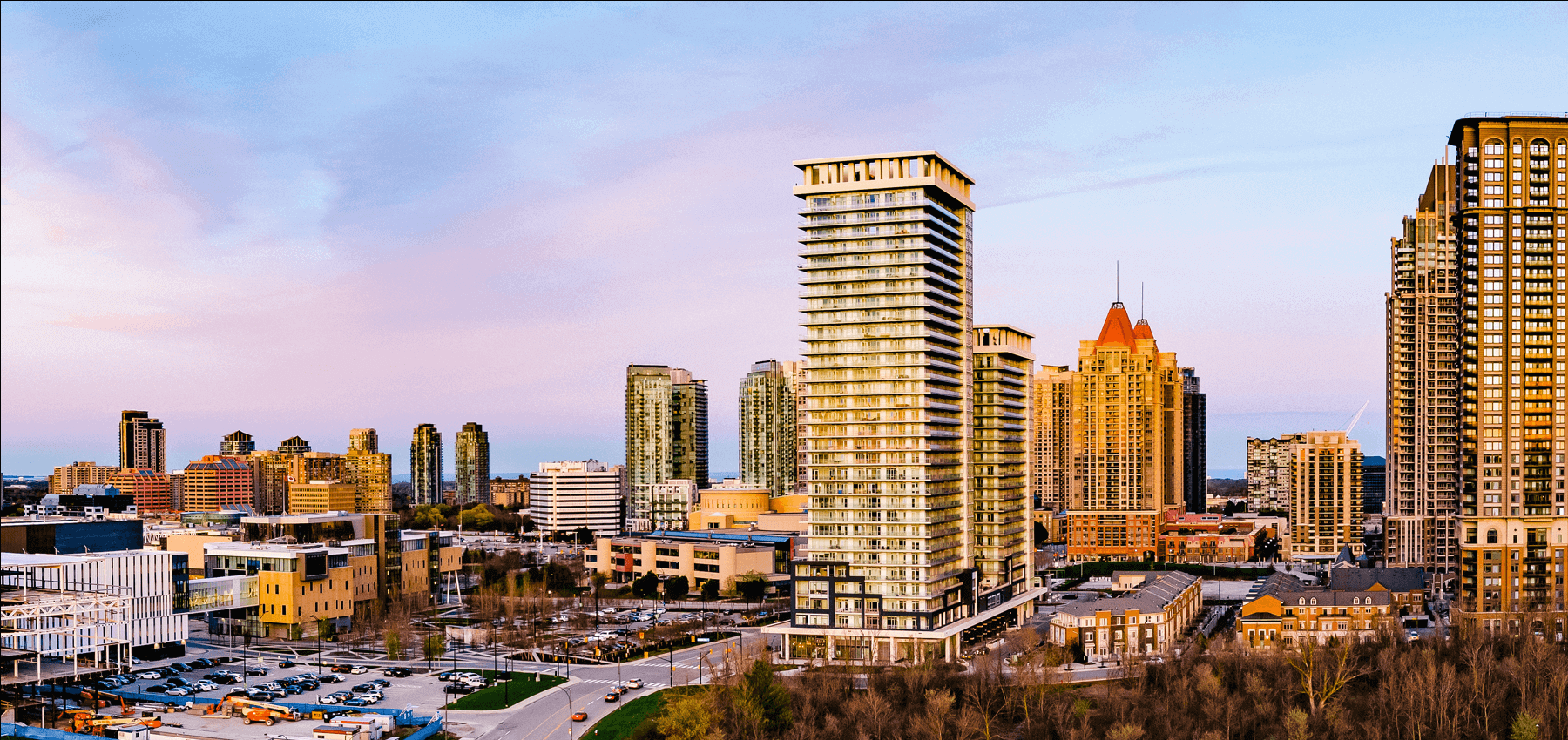As you plan your move to Canada, Toronto and its surrounding cities may be on your list of potential places to live in. Most newcomers to Canada are drawn to metropolitan hubs since they offer a good quality of life, well-established job markets, cultural diversity, and inclusive environments. However, you may want to consider regions just outside of the city, where the cost of living is often more affordable. Mississauga, a vibrant suburb of Toronto that offers many of the same benefits, is a city many newcomers choose to settle in.
In this article, we cover various aspects of living in Mississauga as a newcomer, including the region’s weather, culture, job market, transit system, and more.
In this article:
- About Mississauga
- Weather in Mississauga
- Culture and languages in Mississauga
- Job market in Mississauga
- Renting accommodation in Mississauga
- Transportation in Mississauga
- Education in Mississauga
- Health care in Mississauga
- RBC Newcomer Meeting Place in Mississauga
- Is Mississauga, Ontario a good place to live as a newcomer?
About Mississauga
Mississauga is part of the Greater Toronto Area (GTA), which includes Toronto and the regional municipalities of Peel, York, Halton, and Durham. Mississauga is included in the region of Peel along with the City of Brampton and Town of Caledon. Geographically, it covers an area of 292 square kilometres, and is situated west of Toronto and south of Brampton, with Lake Ontario lining its southern border.
A 30-minute drive from downtown Toronto, Mississauga is the second largest municipality of the GTA (after Toronto) and the sixth largest city in Canada, with a population of approximately 717,000. It is also home to Canada’s largest airport, the Toronto Pearson International Airport.
Weather in Mississauga
Much like Toronto, winters in Mississauga are cold and it snows frequently from November to March. January is the coldest month with temperatures often dropping below -10° C and winds that make it feel even colder.
Summer months of June to August are warm and humid, with average temperatures ranging from 18° C to 27° C. In the spring and fall, rainfall is common. Due to Mississauga’s location next to Lake Ontario, residents who live near the lake are more likely to experience fog, strong winds and heavy snow.
Culture and languages in Mississauga
Mississauga is one of Canada’s most multicultural cities, with more than half of its population made up of newcomers according to the 2016 census. Almost half the newcomers are from Asia—namely India, China, Pakistan, Philippines, and Vietnam. Poland, Portugal, Jamaica, United Kingdom, and Egypt are also among the top 10 birth countries of Mississauga residents.
While 47.6 per cent of Mississauga residents identify English as their first language, another 47 per cent report a language other than English or French as their first language. Among the most prevalent languages spoken besides English are Chinese languages, Urdu, Polish, Punjabi, Arabic and Spanish.
As a newcomer, you will readily find ways to connect with your roots while living in Mississauga, thanks to the many restaurants, grocery stores, cultural events and shops that reflect the diversity of its residents.
Read our article series for information on where to find groceries, food, places of worship, and other services to give you a taste of home in the Greater Toronto Area: |
Read our article to learn about the in-demand jobs in Ontario, along with insights into key industries and cities with the most employment opportunities. You can also download our job market guide to learn more about the scope of your occupation in Canada. |
The city is home to more than 88,650 businesses ranging from small firms to multinational corporations with thousands of employees. Newcomers can explore employment in the city’s key sectors that include advanced manufacturing, financial services, information and communications technology, and life sciences. Additionally, the city boasts of the largest logistics sector in the GTA, accounting for 12.9 per cent of Mississauga’s total employment market.
Many residents have jobs outside of Mississauga, commuting to nearby cities by car or public transit, including downtown Toronto, Kitchener-Waterloo, and Brampton.
Renting accommodation in Mississauga
As a newcomer, booking temporary accommodation may be ideal for your first few weeks in Canada. This way, you can spend time getting to know the neighbourhoods to determine which location will best serve your longer-term housing needs. Since it can take newcomers a few years to save for a down payment to buy a home, it’s typical for newcomers to rent accommodation when they first arrive in Canada.
Mississauga offers a range of rental housing options that you can choose from based on your budget, family size, and lifestyle, including apartments, basement apartments, condos, townhouses, semi-detached, and detached houses. Its many unique neighbourhoods offer environments spanning urban, waterfront and greenbelts.
Average rental prices in Mississauga are 10 to 20 per cent lower than comparable accommodations in the city of Toronto. In April 2022, the average rent for a one-bedroom apartment in Mississauga was $1,816, compared to $2,044 in Toronto. On average, a two-bedroom apartment rented for $2,186 in Mississauga while in Toronto it rented for $2,640. Basement apartments are a common choice for newcomers during their initial months in Canada. While the prices may fluctuate slightly, rental rates for a basement apartment in Mississauga range from approximately $1,200 to $2,000.
Renting a home as a newcomer can be challenging at first, as landlords may require tenants to provide an employment letter or a Canadian credit history before signing a lease. However, there are some workarounds for these requirements. Read our article on how to rent an apartment with no job letter or credit history for more information.
Once you feel ready to buy a home, you can use a site like Houseful to browse available listings in and around Mississauga.
Transportation in Mississauga
People who live in Mississauga travel mainly by car or public transit within the region. Driving is the quickest and easiest way to get around the city due to a vast network of roads and highways, as well as ample parking availability.
If you plan to lease, buy, or drive a car, you’ll need an Ontario driver’s license. Ontario has a three-step graduated driver’s licensing system and most newcomers need to take a knowledge test and two road tests to get a full license (G license). As a newcomer, you may be able to use your foreign driver’s license to drive in Ontario for up to 90 days after you arrive
Many residents rely on Mississauga’s public transit, called MiWay, to travel. It is the third largest municipal transit system in Ontario. You can pay as you board using cash or Presto—a reloadable smart card to access public transportation across Toronto and the GTA. MiWay riders can connect with GO Transit, TTC (including the Kipling subway station), Brampton Transit, and Oakville Transit.
For travel outside of Mississauga, you can take the GO Train from one of the city’s GO stations that connect to downtown Toronto and cities across the GTA. Also easily accessible are VIA Rail stations and the Pearson International Airport for more distant destinations.
Is Mississauga cheaper than Toronto?
In general, the cost of living in Mississauga will be lower than Toronto. Your monthly expenses will depend on a variety of factors, including the neighborhood you choose, your lifestyle, the size of your family, and whether you plan to use public transportation or drive. Since renting accommodation in downtown Toronto is more expensive, a comparable lifestyle in Mississauga will be more affordable. However, you may not find significant difference in the cost of other regular expenses, such as groceries or transport. You can get an estimate of your monthly expenses in Mississauga with Arrive’s cost of living calculator.
Education in Mississauga
Sending your children to school in Mississauga
Mississauga offers several schooling options for children, ranging from free public and Catholic schools to private schools. The Peel District School Board operates public schools in Mississauga, Brampton and Caledon. Catholic schools are managed by the Dufferin-Peel Catholic District School Board which includes all Catholic schools in Mississauga, Brampton, Orangeville, and Caledon. In all, there are 121 elementary and secondary public schools and 114 Catholic elementary and secondary schools in Mississauga.
As a newcomer in Mississauga, you can register your child into Kindergarten through the school board at the age of four or five years. From grade one upwards, you must register your child through the Peel District School Board’s Welcome Centre if you’re new to Peel, Ontario or Canada. Newcomer Welcome Centres offer multicultural liaison officers, settlement workers, and English language classes to help your children better adapt to their new school.
School boards also offer English as a second language (ESL) programs for newcomer children. The school system in Ontario additionally offers international language programs to help kids stay in touch with their mother tongue.
Higher education in Mississauga
Mississauga is home to four academic institutions offering higher education, as well as a number of renowned universities and colleges in nearby Toronto, Waterloo, and Hamilton. The University of Toronto, which consistently ranks among the best universities in Canada, has a campus in Mississauga.
The Sheridan Institute of Technology & Advanced Learning Hazel McCallion Campus, located in downtown Mississauga features the Centre for Creative Thinking as well as the Pilon School of Business. Mohawk College and Lambton College have satellite campuses in Mississauga that are specifically dedicated to international students.
Health care in Mississauga
Canadian permanent residents and citizens living in Mississauga can receive publicly funded health care through the provincial government’s Ontario Health Insurance Program (OHIP). There is no waiting period for OHIP coverage and you can apply for immediate health insurance coverage when you arrive.
Mississauga has several clinics and doctors that provide healthcare services to residents, as well as two full service hospitals that are part of Trillium Health Partners. The Credit Valley Hospital is located in the northwest part of the city, and the Mississauga Hospital, located in the southeast, has the largest emergency centre and concentration of critical care services in Canada.
As you settle into Mississauga, you can use Ontario’s Health Care Connect to find a family doctor in your area. For specialized care, your family doctor can refer you to a specialist.
RBC Newcomer Meeting Place in Mississauga
The Royal Bank of Canada (RBC) has set up several Newcomer Meeting Places across Canada to help newcomers with more than just their banking needs. The Newcomer Meeting Place in Mississauga has dedicated Newcomer Advisors who can help you engage with your new community and introduce you to partners who can support you in your settlement journey. You can book an appointment with an RBC Newcomer Financial Advisor for personalized one-to-one advice and support.
Is Mississauga, Ontario a good place to live as a newcomer?
It’s easy to see why Mississauga has become a popular location for newcomers to call home. While its proximity to Toronto and comparatively lower cost of living are a draw, the city is also rich in cultural diversity. As a newcomer, if you move to Mississauga, you’ll likely find it easy to stay in touch with your roots while enjoying Canada’s high quality of life.






